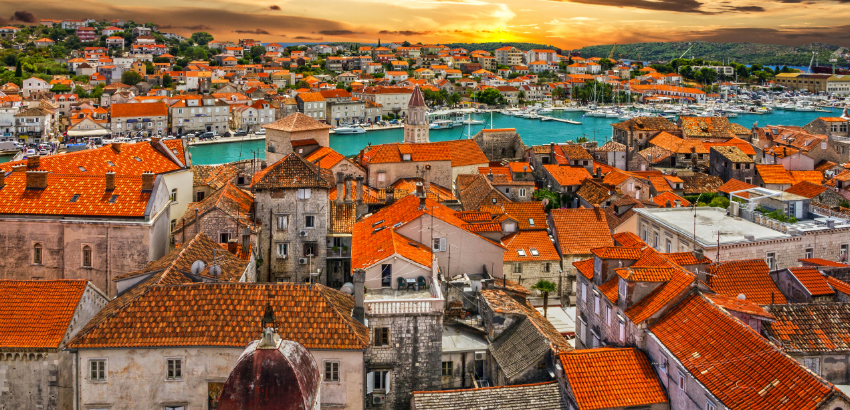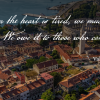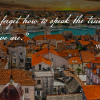
Published: September 15, 1998
View the Original Newsletter: Iskra-18.pdf
About This Issue
The eighteenth issue of Hrvatska Iskra carries a tone of exhaustion and defiance. Editor Valentina Krčmar delivers one of her most emotionally charged reflections, confronting what she sees as the world’s indifference toward Croatian suffering and the growing complacency of Croats themselves. The issue juxtaposes her powerful editorial with political news, reports from the homeland, diaspora updates, and reflections on health, education, and everyday life in both Croatia and Canada.
Motrišta: “We Have Fallen Asleep”
Valentina’s column Motrišta is a stirring critique of global hypocrisy and moral fatigue. She begins by lamenting how being “good” often seems unrewarded — both in politics and in life — and how those who exploit power and deceit often prevail. Her frustration is palpable as she recalls the days when Croatians rallied the world to help during the war. Now, she argues, the urgency has faded.
She condemns Western leaders, particularly Madeleine Albright and the United Nations, for their selective sympathy — mourning Serbian refugees while ignoring the Croatians still suffering displacement, economic ruin, and unhealed wounds. “No one speaks of our dead,” she writes, “our lost, our burned cities, our destroyed youth.”
Valentina warns that Croatia’s struggle has not ended — it has merely changed form. The war, she insists, continues “not in Croatia, but for Croatia.” Her words are both a plea and a warning to the diaspora: that silence and apathy now pose a greater threat than war itself.
Editorial Notes from the Desk
In her introduction, Valentina reflects on the challenges of editing Iskra and the abundance of material she must choose from with each issue. She notes that, despite so much global turmoil — from Kosovo and Afghanistan to Russia’s economic collapse — her focus remains on Croatia. “There is too much sorrow in the world,” she writes, “to waste time on trivial things like Clinton’s scandals while people are dying elsewhere.”
She introduces a variety of articles in this issue, including historical profiles, interviews, and humanitarian appeals. She also mentions receiving a moving letter and phone call from Ante Ljubas, a Croatian patriot imprisoned in Texas, whose words of encouragement remind her why the work of Iskra continues to matter.
News from Croatia and Abroad
The HINA reports and national updates cover major developments of late summer 1998:
-
Pope John Paul II’s upcoming visit to Split and Solin.
-
Legal proceedings against Dinko and Nada Šakić, former Jasenovac camp officials.
-
Bosnian elections, praised by international observers as more peaceful than prior years.
-
U.S. envoy Robert Gelbard’s statements reaffirming America’s support for the Dayton Peace Agreement.
-
Attacks on Albanian villages in Kosovo, underscoring the ongoing violence in the Balkans.
-
International tribunal updates demanding Yugoslavia hand over war crimes suspects tied to the Vukovar Hospital massacre.
Together, these reports show a region still navigating the aftermath of war — politically fractured, morally strained, and closely watched by the global community.
Letters from Readers
Two heartfelt letters highlight the deep connection between the diaspora and homeland.
-
Ante Ljubas, writing from prison, thanks the Iskra team for sending him copies of the paper, describing it as “a light in the dark.” He praises Valentina’s integrity and wisdom, sending reflections from the book Journey to the Heart about the impermanence of life and the beauty found in every moment.
-
Neda Leipen shares personal memories of Vlasta Arnold, daughter of poet Dr. Đuro Arnold, recalling her suffering under the postwar Yugoslav regime. Her letter is both remembrance and lament — a reminder of how many lives were destroyed by ideological persecution.
Community, Culture, and Faith
This issue celebrates the upcoming Croatian language school year in Toronto, encouraging enrollment across elementary, secondary, and university levels. It also includes notices about cultural tribunes, lectures at the Croatian Democratic Union (HDZ) center, and events supporting humanitarian causes like the “Dorina Djeca” children’s fund.
Cultural sections feature historical pieces, including a biography of Josip Kašman, the famous Croatian baritone, and a retelling of the peasant uprising in Veliko Trojstvo, connecting readers to the country’s literary and revolutionary past.
Health and Lifestyle
Dr. Darko Desaty contributes an in-depth article on carbohydrates and nutrition, explaining their essential role in human health and dispelling myths about sugar as “bad food.” The piece encourages balanced diets rich in complex carbohydrates from grains, beans, and fruits — promoting moderation, not deprivation.
Closing Thoughts
Iskra No. 18 embodies both anger and faith — anger at indifference, and faith in the enduring strength of truth. Through her words, Valentina Krčmar calls on readers to reject complacency, to stay alert, and to continue defending Croatia’s dignity not only through memory, but through action.
Her closing sentiment lingers long after the final page: “The danger now is not war — it is our silence.”




